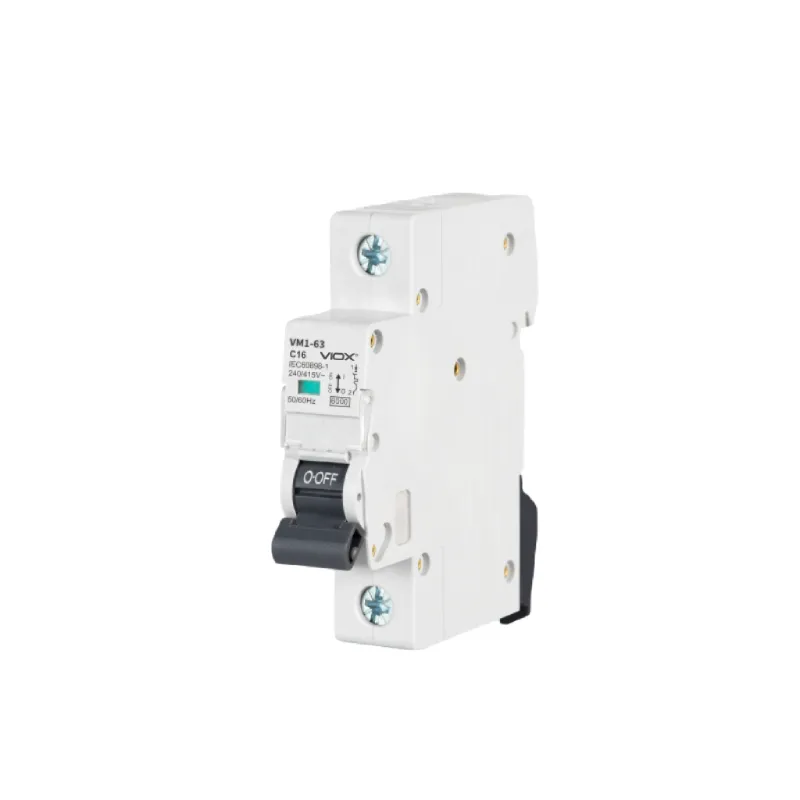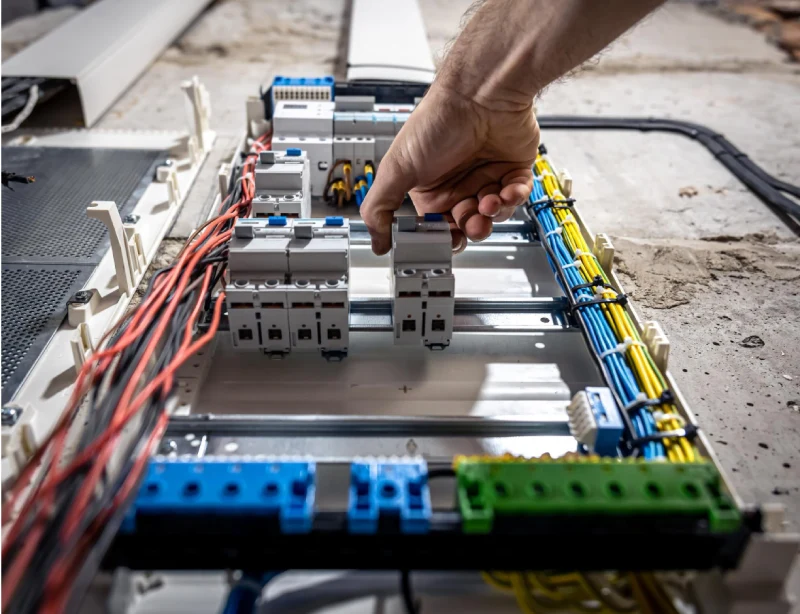When choosing between used and new circuit breakers, new circuit breakers are always the safer, code-compliant choice that provides guaranteed protection, full warranties, and meets current electrical standards. While used circuit breakers cost 50-80% less, they carry significant safety risks and potential code violations that can compromise your electrical system’s protection.
Bottom Line: Professional electricians and electrical codes strongly recommend new circuit breakers for all installations due to safety, reliability, and compliance requirements.
What Are Circuit Breakers and Why Does Condition Matter?
Circuit breakers are essential safety devices that automatically shut off electrical power when they detect dangerous conditions like overloads or short circuits. The condition of a circuit breaker directly impacts your electrical system’s ability to protect against fires, electrocution, and equipment damage.
Key Safety Functions:
- Interrupt dangerous electrical faults within milliseconds
- Protect wiring from overheating and fire hazards
- Prevent electrical shock and electrocution
- Maintain system stability during power surges
Used vs New Circuit Breakers: Complete Comparison
| Factor | New Circuit Breakers | Used Circuit Breakers |
|---|---|---|
| Safety Level | ✅ Maximum protection guaranteed | ⚠️ Unknown reliability, potential failure risk |
| Code Compliance | ✅ Meets all current NEC standards | ❌ May violate local electrical codes |
| Warranty Coverage | ✅ Full manufacturer warranty (5-25 years) | ❌ No warranty protection |
| Testing/Certification | ✅ Factory tested and certified | ❌ Unknown testing history |
| Cost | Higher initial investment ($25-$200+) | 50-80% cost savings ($10-$50) |
| Installation Time | ✅ Standard installation process | ⚠️ May require additional testing/inspection |
| Insurance Approval | ✅ Fully covered by insurance | ❌ May void insurance claims |
| Professional Recommendation | ✅ Universally recommended | ❌ Strongly discouraged |
Key Differences Between Used and New Circuit Breakers
1. Safety and Reliability Standards
New Circuit Breakers:
- Factory-tested to precise specifications
- Guaranteed trip curves and response times
- Fresh internal components with full lifespan remaining
- Quality control certification and UL listing
Used Circuit Breakers:
- Unknown operating history and cycle count
- Potential internal wear or damage
- Compromised trip mechanisms
- No verification of continued UL compliance
2. Code Compliance Requirements
National Electrical Code (NEC) Considerations:
- Article 110.3(B) requires equipment to be “listed” and “identified”
- Used breakers may not maintain their original listing status
- Local codes often explicitly prohibit used electrical components
- Insurance companies may reject claims involving non-compliant equipment
⚠️ Safety Warning: Installing used circuit breakers may violate local electrical codes and void your home insurance coverage.
3. Performance and Longevity
New Circuit Breaker Advantages:
- Full expected lifespan (20-40 years typical)
- Predictable performance characteristics
- Latest safety technology and improvements
- Consistent protection levels
Used Circuit Breaker Risks:
- Shortened remaining lifespan
- Unpredictable failure rates
- Potential safety mechanism degradation
- Unknown exposure to harsh conditions
When Each Option Might Be Considered
New Circuit Breakers Are Required For:
- ✅ All residential installations
- ✅ Commercial and industrial applications
- ✅ Code-compliant electrical work
- ✅ Insurance coverage protection
- ✅ Safety-critical applications
- ✅ Professional electrical contractor work
Used Circuit Breakers (Limited Applications):
⚠️ Rarely Acceptable Scenarios:
- Emergency temporary repairs (with immediate replacement planned)
- Vintage electrical restoration projects
- Educational/training purposes only
- Non-critical equipment testing
🚨 Critical Safety Note: Even in limited scenarios, used circuit breakers should only be installed by licensed electricians after proper testing and with explicit code authority approval.
Cost Analysis: Initial Investment vs Long-Term Value
New Circuit Breaker Investment:
| Breaker Type | Typical Cost Range | Warranty Period |
|---|---|---|
| Single Pole (15-20A) | $25-$50 | 5-10 years |
| Double Pole (30-50A) | $50-$100 | 10-15 years |
| High-Amp (60-200A) | $100-$300 | 15-25 years |
| Specialty/GFCI | $150-$500 | 5-15 years |
Total Cost of Ownership Calculation:
New Breaker Long-Term Value:
- Initial cost + Installation ($50-150 labor)
- Zero replacement costs during warranty
- Full insurance coverage protection
- No code compliance issues
Used Breaker Hidden Costs:
- Lower initial cost + Installation
- Higher failure risk requiring emergency replacement
- Potential insurance claim denial
- Code violation fines and correction costs
- Safety risk exposure
💡 Expert Tip: The potential costs of used breaker failure far exceed the initial savings, making new breakers the economically smart choice.
Professional Selection Criteria
How to Choose the Right New Circuit Breaker:
- Amperage Rating Matching
- Must match existing panel specifications
- Size according to circuit load calculations
- Follow NEC ampacity requirements
- Manufacturer Compatibility
- Use only breakers approved for your panel brand
- Verify UL classification compatibility
- Check for proper physical fit
- Special Feature Requirements
- GFCI protection for wet locations
- AFCI protection for living areas
- Combination AFCI/GFCI where required
- Quality Standards Verification
- UL Listed certification
- Current NEC compliance
- Manufacturer warranty coverage
🔍 What to Look for When Purchasing:
Essential Requirements:
- UL listing mark and current certification
- Proper amperage and voltage ratings
- Manufacturer model compatibility verification
- Sealed packaging with documentation
Quality Indicators:
- Reputable manufacturer (Square D, GE, Eaton, Siemens)
- Clear labeling and specifications
- Included installation instructions
- Warranty registration information
Installation and Safety Guidelines
Professional Installation Requirements:
🚨 Safety Warning: Circuit breaker installation requires licensed electrical work and should never be attempted by unqualified individuals. Improper installation can cause fires, electrocution, or death.
Professional Installation Process:
- Power isolation and lockout/tagout procedures
- Load calculation verification
- Compatibility testing with existing panel
- Proper torque specifications for connections
- Function testing and verification
- Code compliance inspection
Testing and Verification Steps:
New Breaker Commissioning:
- Continuity testing before installation
- Proper mounting and connection verification
- Trip function testing at safe test current
- Load testing under normal operating conditions
- Documentation of installation and testing
Troubleshooting Common Issues
Signs of Circuit Breaker Problems:
Immediate Replacement Indicators:
- Breaker trips repeatedly without overload
- Physical damage, burn marks, or corrosion
- Loose connections or overheating
- Age exceeding manufacturer recommendations
- Failed electrical testing
Performance Warning Signs:
- Delayed tripping response
- Inconsistent operation
- Unusual noise during operation
- Visual wear or damage indicators
When to Call a Professional:
Always Contact Licensed Electrician For:
- Any circuit breaker replacement
- Electrical panel upgrades
- Code compliance questions
- Safety testing and verification
- Insurance requirement consultations
Frequently Asked Questions
Can I use a used circuit breaker in my home electrical panel?
No, used circuit breakers are not recommended for residential installations. They pose significant safety risks, may violate electrical codes, and can void insurance coverage. New circuit breakers provide guaranteed protection and code compliance.
What’s the actual cost difference between used and new circuit breakers?
Used circuit breakers typically cost 50-80% less than new ones, but the hidden costs of potential failures, code violations, and insurance issues make new breakers the more economical choice long-term.
Do used circuit breakers meet electrical code requirements?
Generally no. Most electrical codes require “listed” equipment, and used circuit breakers cannot maintain their original UL listing status. Local codes often explicitly prohibit used electrical components.
How can I tell if a circuit breaker needs replacement?
Signs include repeated tripping without overload, physical damage, burn marks, corrosion, loose connections, or age exceeding 20-30 years. Any of these indicators require professional evaluation and likely replacement.
Are there any situations where used circuit breakers are acceptable?
Very limited scenarios exist, such as emergency temporary repairs with immediate replacement planned, vintage restoration projects, or educational purposes. Even then, professional installation and local code approval are required.
What warranty comes with new circuit breakers?
New circuit breakers typically include 5-25 year manufacturer warranties depending on type and brand. This covers manufacturing defects and provides replacement protection during the warranty period.
Can used circuit breakers cause insurance problems?
Yes, insurance companies may deny claims related to electrical fires or damage if non-compliant used equipment is discovered. Always use new, properly installed circuit breakers to maintain full insurance coverage.
What should I look for when buying a new circuit breaker?
Verify UL listing, proper amperage/voltage ratings, manufacturer compatibility with your panel, sealed packaging, warranty information, and current NEC compliance. Purchase only from authorized electrical suppliers.
Expert Selection Guide: Making the Right Choice
Decision Framework:
Choose New Circuit Breakers When:
- Installing in residential or commercial applications
- Code compliance is required
- Insurance coverage must be maintained
- Long-term reliability is essential
- Professional electrician recommends replacement
Consider Alternatives Only When:
- Licensed electrician explicitly approves for specific application
- Local electrical authority provides written exception
- Temporary emergency repair with immediate replacement planned
🎯 Professional Recommendation:
Always invest in new circuit breakers. The minimal cost savings of used breakers are far outweighed by the safety risks, code compliance issues, and potential liability exposure. Your electrical system’s safety is worth the investment in new, certified equipment.
Next Steps:
- Consult a licensed electrician for proper assessment
- Verify local code requirements before purchase
- Choose UL-listed new breakers from reputable manufacturers
- Schedule professional installation and testing
- Maintain documentation for warranty and insurance purposes
🔒 Final Safety Reminder: Never compromise on electrical safety. New circuit breakers provide the protection, compliance, and peace of mind that used equipment simply cannot guarantee.
Related
Mechanical Life vs Electrical Life of Circuit Breakers
Top 5 Reasons Why Your MCB Keeps Tripping And How to Fix Them
What Is a Miniature Circuit Breaker (MCB): Complete Guide for Safety and Selection








